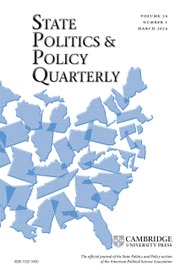Crossref Citations
This article has been cited by the following publications. This list is generated based on data provided by
Crossref.
Phillips, Trisha
2021.
Ethics of Field Experiments.
Annual Review of Political Science,
Vol. 24,
Issue. 1,
p.
277.
Kirk, David S.
Rovira, Marti
and
Jackson, Jonathan
2022.
Do black lives matter to employers? A combined field and natural experiment of racially disparate hiring practices in the wake of protests against police violence and racial oppression.
PLOS ONE,
Vol. 17,
Issue. 5,
p.
e0267889.
Bischof, Daniel
Cohen, Gidon
Cohen, Sarah
Foos, Florian
Kuhn, Patrick Michael
Nanou, Kyriaki
Visalvanich, Neil
and
Vivyan, Nick
2022.
Advantages, Challenges and Limitations of Audit Experiments with Constituents.
Political Studies Review,
Vol. 20,
Issue. 2,
p.
192.
Zittel, Thomas
Louwerse, Tom
Helboe Pedersen, Helene
and
Schakel, Wouter
2023.
Should we conduct correspondence study field experiments with political elites?.
International Political Science Review,
Vol. 44,
Issue. 4,
p.
459.
Diermeier, Matthias
2023.
Tailoring the truth – evidence on parliamentarians’ responsiveness and misinformation toleration from a field experiment.
European Political Science Review,
Vol. 15,
Issue. 3,
p.
332.
Barnfield, Matthew
2023.
Misinformation in Experimental Political Science.
Perspectives on Politics,
Vol. 21,
Issue. 4,
p.
1210.
Randall, Dwayne
2023.
Correspondence Audits as a Method to Study Racial Discrimination.
SSRN Electronic Journal,
PEARLMAN, WENDY
2023.
Emotional Sensibility: Exploring the Methodological and Ethical Implications of Research Participants’ Emotions.
American Political Science Review,
Vol. 117,
Issue. 4,
p.
1241.
Hannah, A Lee
Reuning, Kevin
and
Whitesell, Anne
2023.
The Party Replies: Examining Local Party Responsiveness to Prospective Campaign Volunteers.
Political Research Quarterly,
Vol. 76,
Issue. 2,
p.
931.
Costa, Mia
Crabtree, Charles
Holbein, John B.
and
Landgrave, Michelangelo
2023.
Is that ethical? An exploration of political scientists’ views on research ethics.
Research & Politics,
Vol. 10,
Issue. 4,
Garcia, Matthew Mendez
and
Sadhwani, Sara
2023.
¿Quién Importa? State Legislators and Their Responsiveness to Undocumented Immigrants.
Political Research Quarterly,
Vol. 76,
Issue. 3,
p.
1357.
Kreps, Sarah
and
Kriner, Douglas L.
2024.
The potential impact of emerging technologies on democratic representation: Evidence from a field experiment.
New Media & Society,
Vol. 26,
Issue. 12,
p.
6918.
Agan, Amanda Y.
Cowgill, Bo
and
Gee, Laura
2024.
The Tradeoffs of Transparency: Measuring Discrimination When Subjects Are Told They Are in an Experiment.
SSRN Electronic Journal,
R. Grose, Christian
and
K. Wood, Abby
2024.
Causal Inference and American Political Development.
Vol. 17,
Issue. ,
p.
173.
Jap, Jangai
2024.
Can Encounters With the State Improve Minority-State Relations? Evidence From Myanmar.
Comparative Political Studies,
Vol. 57,
Issue. 13,
p.
2225.
Rovelo, Aime
Hyde, Aryanna
and
Landgrave, Michelangelo
2025.
Why Does Corrective Information Have a Muted Effect on Immigration Attitudes? Motivated Reasoning and Shifting Goalposts.
American Politics Research,
Kustov, Alexander
and
Landgrave, Michelangelo
2025.
Immigration is difficult?! Informing voters about immigration policy fosters pro-immigration views.
Journal of Experimental Political Science,
p.
1.


